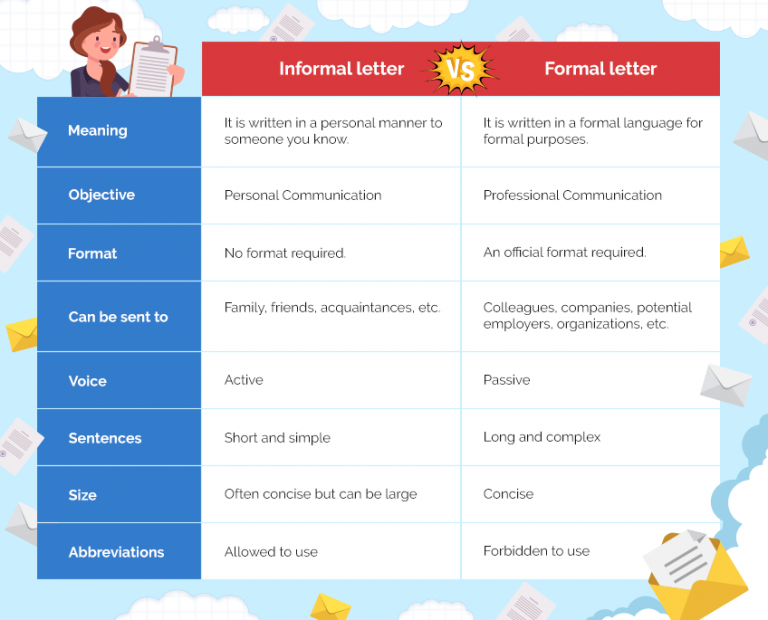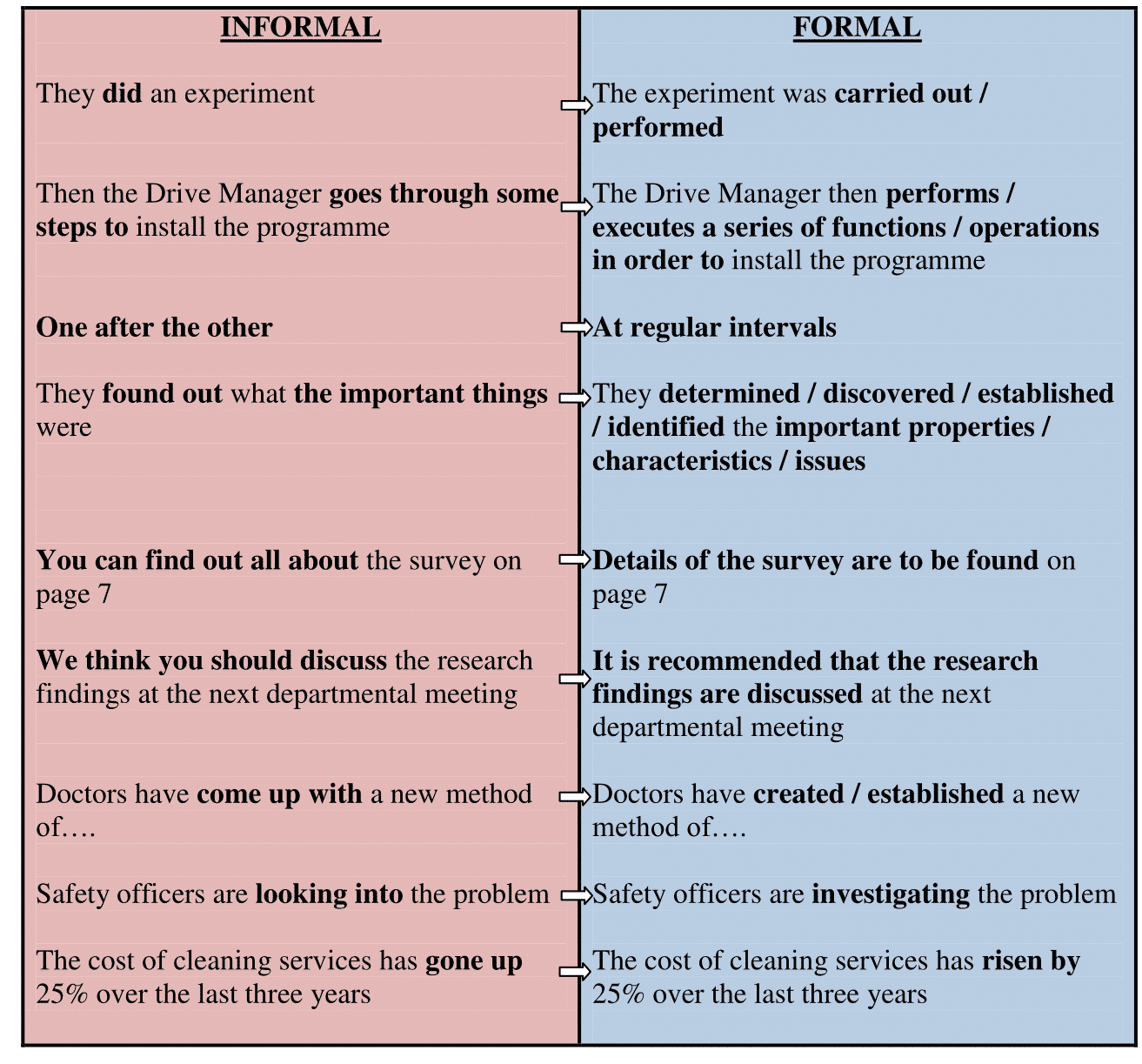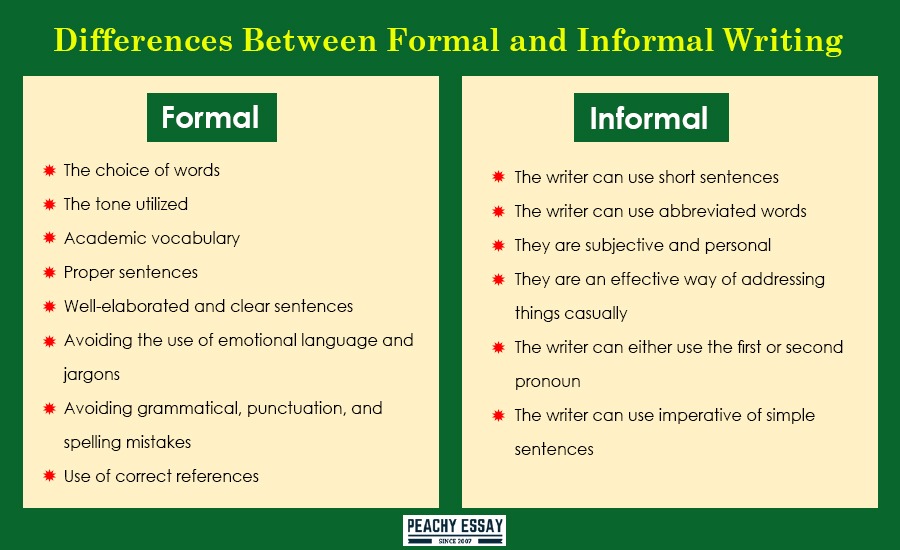Formal and Informal Language Formal vs. Informal Words • 7ESL

Write a Formal Letter and Informal Letter
Writing formal and informal letters. Understanding the difference between a formal and an informal letter. Writing formal letters. How to write formal letters. Writing an email.

Differences between Formal vs. Informal Letters ESLBUZZ
Formal letters are official and professional, while informal letters are personal and casual in nature. Formal letters follow specific formats and conventions, while informal letters have a more flexible structure and style. Formal letters use formal language and tone, while informal letters rely on everyday language and conversational tone.

The Difference Between Formal and Informal Writing
A formal letter is a letter, written in formal language, in the stipulated format, for official purpose. A letter written in an friendly manner, to someone you are familiar with, is called informal letter. Written in prescribed format only. No prescribed format. First person - Business letters, third person - others.

Useful Formal and Informal Expressions in English • 7ESL
A formal letter is a letter, written in formal language, in the stipulated format, for official purpose. A letter written in an friendly manner, to someone you are familiar with, is called informal letter. Written in prescribed format only. No prescribed format. First person - Business letters, third person - others.

Informal vs. Formal English Writing A Letter or Email ESLBUZZ
If you'd like to use any of the Twinkl downloads demonstrated in this 'formal vs informal letters' video, you can download them at the following links.Inform.

How to Write a Letter Informal and Formal English ESL Buzz
The main difference between formal and informal letter writing is the tone. Formal letters are usually more serious and formal in tone, while informal letters are more personal and friendly. Another difference is the structure; formal letters follow a specific format, while informal letters can be more free-flowing.

Differences between Formal vs. Informal Letters ESL Buzz
6/ Attention to grammar and spelling: Both formal and informal letters require attention to proper grammar, punctuation, and spelling to maintain clarity and professionalism. 7/ Signature: Both types of letters typically include a handwritten or digital signature to provide a personal touch.

Writing Formal vs. Informal Letters Worksheet Have Fun Teaching Letter worksheets, Writing
Informal writing can use sentences, paragraphs, vocabulary, and punctuation much more freely for dramatic effect or simply to sound relaxed, chatty and friendly. There is no expectation to be.

The Differences between Formal & Informal Language Ingilizce
Depending on the exam you are doing, some of these are more likely than others. In IELTS General Training exams, Writing Part 1 can be an informal, semi-formal or formal letter. In Cambridge exams, you'd expect to see informal letters at B1 Preliminary level, but the higher the level, the more formal the writing tasks will be.

Formal and Informal Language Formal vs. Informal Words • 7ESL
The article "formal vs informal letter" explains the two types of letters in more detail and explains the key points of difference between the two. Definitions and meanings Formal Letter: A formal letter is a type of letter which is written to communicate complaints, requests, inquiries, proposals, invitations and other official matters in.

SOLUTION Formal letter and informal letter differences and divisions Studypool
Difference Between Formal and Informal Letter. The main difference between a formal and an informal letter is that an informal letter is written in a more conversational style, while a formal letter is used when writing to someone of higher social status or authority. An informal letter is typically used for personal correspondence with family.

Formal vs. Informal Letters What's the Difference? YouTube
But there are also more notable differences between formal and informal language. We'll give some examples below. 1. Contractions. It is advised to avoid contractions (shortened versions of words) in formal language, but they're acceptable in informal language. Unfortunately, the team could not replicate the results.

How to write letters Formal letter Informal letter YouTube
Formal letters often follow strict conventions in structure, tone, and language. Informal Letter: Hey, just wanted to tell you that I got a new puppy! Informal letters are more casual and may contain colloquialisms, contractions, and slang. Formal Letter: Yours sincerely, [Your Name] Formal letters often end with formal closings and your name.

Informal vs. Formal English Writing A Letter or Email ESLBUZZ
Worksheets and downloads. An informal email or letter - exercises 1.05 MB. An informal email or letter - answers 111.83 KB. An informal email or letter - email 1.01 MB. An informal email or letter - writing practice 137.38 KB.

Differences between Formal vs. Informal Letters ESL Buzz
Formal letters are requests, applications, enquiries etc. sent to people or organisations. The tone is respectful and the letter is structured. Informal letters are sent to friends and relatives. The tone is casual and friendly. FORMAL. INFORMAL. Beginning. Ending. Dear Sir/Madam / Dear Mr/Ms Brown.

Formal vs. Informal Best Writing Practices
by Hasa. 4 min read. Main Difference: The main difference between a formal letter and an informal letter is their purpose: a formal letter is written for professional (official and business) communication while the informal letter is used for personal communication. A letter is a written message from one party to another containing information.